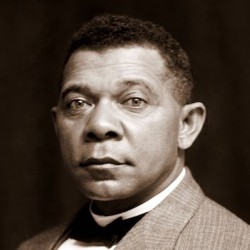
Booker T. Washington
American educator and author
| Date of Birth | : | 05 Apr, 1856 |
| Date of Death | : | 14 Nov, 1915 |
| Place of Birth | : | Hale's Ford, Westlake Corner, VA |
| Profession | : | Educator, Author |
| Nationality | : | American |
Booker T. Washington (born April 5, 1856, Franklin county, Virginia, U.S.—died November 14, 1915, Tuskegee, Alabama) educator and reformer, first president and principal developer of Tuskegee Normal and Industrial Institute (now Tuskegee University), and the most influential spokesman for Black Americans between 1895 and 1915.
He was born in a slave hut but, after emancipation, moved with his family to Malden, West Virginia. Dire poverty ruled out regular schooling; at age nine he began working, first in a salt furnace and later in a coal mine. Determined to get an education, he enrolled at the Hampton Normal and Agricultural Institute (now Hampton University) in Virginia (1872), working as a janitor to help pay expenses. He graduated in 1875 and returned to Malden, where for two years he taught children in a day school and adults at night. Following studies at Wayland Seminary, Washington, D.C. (1878–79), he joined the staff of Hampton.
In 1881 Washington was selected to head a newly established normal school for African Americans at Tuskegee, an institution with two small converted buildings, no equipment, and very little money. Tuskegee Normal and Industrial Institute became a monument to his life’s work. At his death 34 years later, it had more than 100 well-equipped buildings, some 1,500 students, a faculty of nearly 200 teaching 38 trades and professions, and an endowment of approximately $2 million.
Early Life
Washington believed that the best interests of Black people in the post-Reconstruction era could be realized through education in the crafts and industrial skills and the cultivation of the virtues of patience, enterprise, and thrift. He urged his fellow Blacks, most of whom were impoverished and illiterate farm labourers, to temporarily abandon their efforts to win full civil rights and political power and instead to cultivate their industrial and farming skills so as to attain economic security. Blacks would thus accept segregation and discrimination, but their eventual acquisition of wealth and culture would gradually win for them the respect and acceptance of the white community. This would break down the divisions between the two races and lead to equal citizenship for Blacks in the end. In his epochal speech (September 18, 1895) to a racially mixed audience at the Atlanta Exposition, Washington summed up his pragmatic approach in the famous phrase. These sentiments were called the Atlanta Compromise by such critics as the Black intellectual W.E.B. Du Bois, who deplored Washington’s emphasis on vocational skills to the detriment of academic development and civil rights. And indeed it is true that, during the period of Washington’s ascendancy as national spokesman for African Americans, his race was systematically excluded both from the franchise and from any effective participation in national political life, and rigid patterns of segregation and discrimination became institutionalized in the Southern states. Even Washington’s visit to the White House in 1901 was greeted with a storm of protest as a “breach of racial etiquette.”
Most Blacks felt comfortable with Washington’s approach, however, and his influence among whites was such that he became an unofficial arbiter determining which Black individuals and institutions were deemed worthy to benefit from government patronage and white philanthropic support. He went on to receive honorary degrees from Harvard University (1896) and Dartmouth College (1901). Among his dozen books is his autobiography, Up from Slavery (1901), translated into many languages.
Quotes
Total 24 Quotes
There is a certain class of race problem-solvers who don't want the patient to get well, because as long as the disease holds out they have not only an easy means of making a living, but also an easy medium through which to make themselves prominent before the public.
There is another class of coloured people who make a business of keeping the troubles, the wrongs, and the hardships of the Negro race before the public. Having learned that they are able to make a living out of their troubles, they have grown into the settled habit of advertising their wrongs — partly because they want sympathy and partly because it pays. Some of these people do not want the Negro to lose his grievances, because they do not want to lose their jobs.
I have learned that success is to be measured not so much by the position that one has reached in life as by the obstacles which he has had to overcome while trying to succeed.
The happiest people are those who do the most for others. The most miserable are those who do the least.
Success waits patiently for anyone who has the determination and strength to seize it.
Most leaders spend time trying to get others to think highly of them, when instead they should try to get their people to think more highly of themselves. It's wonderful when the people believe in their leader. It's more wonderful when the leader believes in their people! You can't hold a man down without staying down with him.
If you want to lift yourself up, lift up someone else.
Of all forms of slavery there is none that is so harmful and degrading as that form of slavery which tempts one human being to hate another by reason of his race or color. One man cannot hold another man down in the ditch without remaining down in the ditch with him.
Living is the art of loving. Loving is the art of caring. Caring is the art of sharing. Sharing is the art of living. If you want to lift yourself up, lift up someone else.
I would permit no man, no matter what his colour might be, to narrow and degrade my soul by making me hate him.
